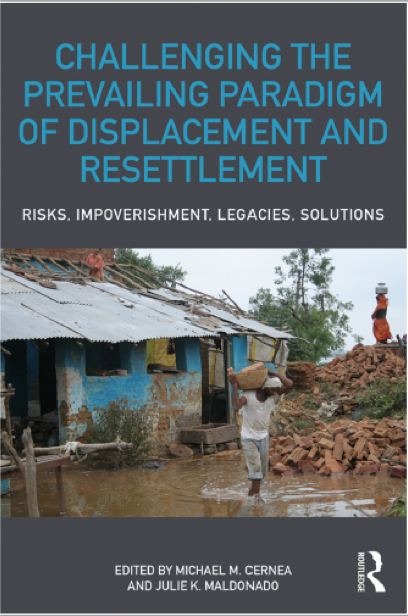An account is required to join the Society, renew annual memberships online, register for the Annual Meeting, and access the journals Practicing Anthropology and Human Organization
- Hello Guest!|Log In | Register
Book Review
August 1, 2019
 Challenging the Prevailing Paradigm of Displacement and Resettlement: Risks, Impoverishment, Legacies, Solutions
Challenging the Prevailing Paradigm of Displacement and Resettlement: Risks, Impoverishment, Legacies, Solutions
Michael M. Cernea and Julie K. Maldonado, eds.
Development-caused forced displacement and resettlement (DFDR) is a critical problem on the international development agenda. The frequency of forced displacements is rapidly increasing, the sheer numbers of uprooted and impoverished people reveal fast accelerating trends, whilst government reporting remains poor and misleading. Challenging the Prevailing Paradigm of Displacement and Resettlement analyzes widespread impoverishment outcomes, risks to human rights, and other adverse impacts o fdisplacement; itdocuments under-compensation of expropriated people, critiques cost externalization on resettlers, and points a laser light on the absence of protective, robust, and binding legal frameworks in the overwhelming majority of developing countries.
In response, this book proposes constructive solutions to improve quality and measure the outcomes of forced resettlement, prevent the mass-manufacturing of new poverty, promote social justice, and respect human rights. It also advocates for the reparation of bad legacies left behind by failed resettlement. It brings together prominent scholars and practitioners from several countries who argue that states, development agencies, and private sector corporations which trigger displacements must adopt a“resettlement with development”paradigm.
As editors, we designed the volume not only to provide a critical analysis of the prevailing paradigm and state of affairs in displacement and resettlement practice in various sectors (Part I), but also to propose and argue for a robust set of distinct solutions to practically and operationally improve the performance level of acceptable resettlement policies and diminish or reduce injustices and violations (Part II). The book’s chapters analyze the mechanisms of deprivation, and of economic, cultural, and social exclusion, injustices, dysfunctional impacts on local communities, violations of laws and stated policies, including chronic abuses of the legal principle of eminent domain. All chapters make recommendations and propose solutions towards the formulation and introduction of a new resettlement paradigm. We envisage this paradigm to be defined as, and to help achieve, “resettlement with development,” which is substantially different in concept, planning, sequencing, resources, and implementation from the paradigm prevailing now in the practices of many development projects in many countries, which is known to practitioners and researchers as “resettlement with impoverishment.”
In sum,at this critical time these chapters and this volume deliberately challenge ossified paradigms, weak policies non-commensurate with the grave issues that need to be addressed, old mindsets, and dysfunctional practices that the group of co-authors decided to candidly and weightily place on the table of public discussion.
Towards this end, the book’s co-authors translate cutting edge research into legal, economic, financial, policy, and pragmatic operational recommendations. An inspiring and compelling guide to the field, Challenging the Prevailing Paradigm of Displacement and Resettlement will be of interest to university faculty, government officials, private corporations, researchers, and students in anthropology, economics, sociology, law, politicalscience, human geography, and international development.

Cart
Search